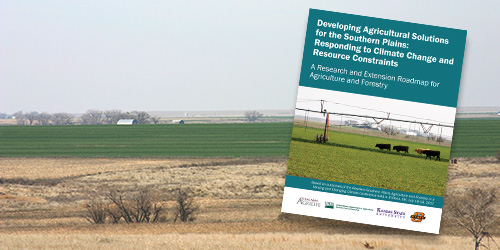“Developing Agricultural Solutions for the Southern Plains: Responding to Climate Change and Resource Constraints, A Research and Extension Roadmap for Agriculture and Forestry,” a report based on outcomes of the Resilient Southern Plains Agriculture and Forestry in a Varying and Changing Climate conference, held in July 2017 in El Reno, Oklahoma, is now available online.
The roadmap, which follows directly from the initial work of the 2017 conference, is targeted at the development of research and extension priorities for agriculture and forestry in the Southern Plains states of Kansas, Oklahoma and Texas but also applies to parts of Colorado and New Mexico.
General production needs for the Southern Plains were outlined:
- Timely, authoritative and reliable weather and climate forecasts and tools
- Soil health protection, enhancement and sustainability
- Water quality, supply and sustainability
- Sustainable systems to assure economic viability
The roadmap also identified specific needs in the four major areas of regional agricultural production:
- Irrigated and Dryland Food and Fiber Production
- Range, Grassland and Livestock Management
- Forestry and Silviculture Management
- Concentrated Animal Feeding Operations (CAFOs)
According to the roadmap, the goal is to present a gap or need, along with an opportunity, for each of these topics, taking into consideration anticipated stresses due to limited resources as well as weather and climate risks and changes.
The conference was jointly organized by Kansas State University, Oklahoma State University, Texas A&M University and the USDA Southern Plains Climate Hub and hosted by Redlands Community College. It served as a platform for assessing the current understanding of how climate variations and changes affect Southern Plains agriculture and for prioritizing research, extension and education needs consistent with that understanding. Approximately 80 attendees representing federal, academic, extension and producer and commodity perspectives participated in the 1.5-day event.
For more information on the conference and its white papers, read this Conservation Matters article written by Dr. Ron Lacewell, Texas A&M AgriLife assistant vice chancellor of federal relations, this Conservation Matters conference report article or go the conference website.

